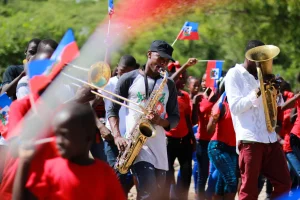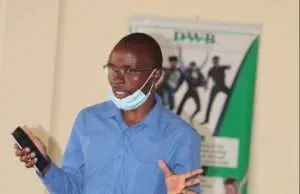Ibrahim Traoré and a Vision of Self-Reliance
At the recent Second Russia-Africa Economic and Humanitarian Forum on July 28, Burkina Faso’s interim leader, Captain Ibrahim Traoré, seized the global stage to articulate his profound vision for an empowered and autonomous Africa. His impassioned speech drew immediate parallels with the legendary pan-Africanist leader, Thomas Sankara, as both listeners and commentators recognized echoes of Sankara’s dedicated advocacy for African sovereignty and self-determination.
The likeness was so strong that some recalled Sankara’s ominous words from 1987, “Kill Sankara, and thousands of Sankaras will be born.” This statement, an eerie forewarning of his subsequent assassination via a coup d’état, has only recently been brought into sharp focus with Radio France Internationale (RFI)’s revelations regarding France’s alleged involvement in this heinous act.
Jointly chaired by Russian President Vladimir Putin and the President of Comoros, Azali Assoumani, the summit in Saint Petersburg saw the participation of 49 national delegations, including 16 African heads of state. This comes as a continuation of the first summit, co-hosted by Putin and Egyptian President Abdel Fattah el-Sisi in February 2019.
The New Chapter of Pan-Africanism: Ibrahim Traoré and a Bold Plea for Self-Recognition and Independence
Captain Traoré’s address was laden with references to historical memory and justice. He highlighted the overlooked contributions of the Soviet Union and Africa to the struggle against German Nazism and Italian fascism during World War II, a narrative that often downplays the essential roles played by these nations in favor of Western powers such as the United States, the United Kingdom, and France.
On the contemporary front, Traoré outlined the continuing struggles Burkina Faso faces against terrorism, neo-colonialism, and imperialism. He challenged the international labeling of their self-defense forces as “militias,” and instead appealed for judgments based on cultural relativism.
Burkina Faso’s Struggles: The Dichotomy of Riches and Deprivation, and the Battle with Neo-colonialism
Traoré spoke on the paradox of wealth and poverty that defines the African continent, rich in resources but impoverished in living conditions. He also shed light on the migration crisis, where desperate Africans risk their lives seeking better prospects in Europe.
In a strong indictment of African leadership, Traoré asked his fellow African leaders to stand up to manipulation by imperialistic forces. He made reference to Burkina Faso’s ‘VDF’ (Volunteers for the Defense of the Fatherland) and their struggle against terrorism, asking, “Since 2019, Burkina Faso has implemented the renowned ‘VDF’. They assist our regular army in battling border and internal terrorism.”
As part of his vision for the continent, Traoré stressed the importance of food self-sufficiency, praising Russian President Vladimir Putin’s announcement of free grain to six African nations after the collapse of the Black Sea deal. He framed this as a lesson for African leaders, asserting, “At the next forum, we must not come here without having ensured food self-sufficiency for our peoples.”
In a powerful conclusion, Traoré evoked the spirit of Thomas Sankara’s 1984 UN address, using the phrases, “The slave who is unable to assume his revolt does not deserve to be pitied” and ‘Fatherland or death: we shall triumph!’ These words resonated across social media, igniting passion and determination in African youth.
Traoré’s Background and the Wave of Change in Francophone Africa
Captain Ibrahim Traoré, a young military officer from Bondokuy in Burkina Faso, led a coup d’État on September 30, 2022, and subsequently took over as head of state. This coup is part of a larger pattern across Francophone Africa, with military-led coups occurring in Mali, Chad, Guinea, Burkina Faso, and Niger—all former colonies of France.
These coups are reactions against what is perceived as the continuation of colonialism – a system known as “françafrique.” Leaders orchestrating these coups criticize the ties between civilian authorities and this system, questioning the roles of Western powers in Africa’s ongoing terrorism crisis.
Remarkably, citizens in these nations have often supported these military interventions. The support of the populace, coupled with the controversial issues like the surge of military bases across Africa and the maintenance of biased trade contracts, reflects the region’s outcry against persistent exploitation.
Sociological Context: The Rising Popularity of Military Rule
The current rise of military leadership occurs amid a renewed scramble for Africa, where former colonial powers like France, Great Britain, and new global players like China, Turkey, India, and Brazil are vying for influence. Unlike the 1884-1885 Berlin conference, which enacted the historical division and exploitation of Africa, there is a growing sense of defiance and self-determination on the continent.
Africa is transitioning from a passive spectator to an assertive actor, in a world that is steadily and irreversibly moving from a unipolar moment to a multiplex world. A trend recognized by Amitav Acharya since 2014.
Towards an Autonomous Future: Leveraging Youth and Diaspora for Self-Governance

This period of transformation in Africa is marked by support from the African diaspora and the rise of influential figures who resonate with the youth. With its youthful and growing population and rich natural resources, Africa is poised to harness its demographic power to advance towards self-governance.
Icons like Kemi Seba, Nathalie Yamb, and Ousmane Sonko echo the visions of Marcus Garvey, W.E.B. Du Bois, Richard Wright, Martin Luther King Jr., Malcolm X, and Huey Percy Newton. The words of Charles Henry Pearson in 1893 and Gustave Le Bon’s 1894 psychological laws of human evolution allude to Africa’s rise after China, propelled by growth and industrialization.
As Africa continues on this path of self-determination, Captain Ibrahim Traoré’s rallying cry serves as a powerful symbol of a continent that seeks dignity, autonomy, and equitable recognition in the world. His vision is a beacon for a future where Africa stands strong, self-reliant, and equal on the global stage.







